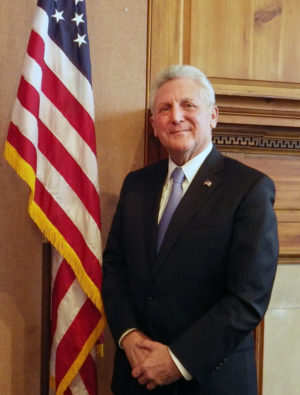
Despite contending with Covid-19 and statewide economic challenges, newly reelected Norwalk Mayor Harry Rilling remains optimistic about the city”™s future and the state of its business community.
Rilling, a Democrat, won his fourth consecutive two-year term as mayor with over 60% of the vote against Republican challenger Jonathan Riddle.
“The business climate in Norwalk is I think pretty solid,” he told the Business Journal. “In order to facilitate attracting businesses to Norwalk, I hired a chief of economic and community development and hired a director of business. They”™re constantly working on that issue. Since the pandemic started, 412 new businesses have opened in Norwalk.”
Rilling cited population growth ”” and Norwalk”™s advantageous position of being part of the New York metropolitan area while being cheaper than much of Westchester County or Stamford ”” as reasons to believe more businesses are taking notice of the city.
Additionally, the city has revamped much of its permitting and licensing processes.
“It”™s interesting because we”™d been working on streamlining that process and making more of it available online so that people might not even need to come to City Hall under certain circumstances,” Rilling said. “The pandemic made us fast-track that process, because while City Hall never closed, we didn”™t allow in the public.”
According to the mayor, this process will continue to go forward, and it may become possible in the near future for those looking to start businesses, apply for registration, or otherwise work with City Hall to do the entire process online. Those looking for certifications and licenses can already use the Norwalk website to request inspections.
Additionally, Rilling said that a complete rewrite of the city”™s zoning laws is underway with the help of Town Planning and Urban Design Collaborative, a consulting firm specializing in helping municipalities establish mixed-use areas ”” the first complete overhaul of Norwalk”™s zoning regulations in more than 30 years. Part of the plan will include merging the planning and zoning commissions to lessen the need for the same issues to be brought before multiple panels or committees, and reduce the possibility of contradictory regulations where the two bodies overlap.
“We are going to do some public outreach because we want to look at how we can make our zoning laws a little more consistent with our plan of conservation and development,” he said.
The need to increase housing availability might also be partially addressed through the creation of micro-apartments and accessory dwelling units. Rilling posited a hypothetical:
“I”™ve got a son who goes off to college. He wants to come back but he doesn”™t want to live with me, but he can live in an accessory apartment and feel a little bit more independent until he can get his feet on the ground and save up for a house. We”™re looking at all kinds of different things we can do to attract not only people, but to attract businesses.”
The key challenges to achieving those goals, as Rilling sees it, are matters of safety.
“First and foremost we want to keep moving forward with vaccinating people, monitoring the pandemic and determining at any given time what are the appropriate responses,” he said. “I made it clear from the very beginning that I was going to follow the science and do what I felt was necessary to keep our community safe.”
While the city switched from a mask mandate in public spaces to an advisory on Nov. 5, Rilling stressed that if infection numbers once again begin to rise, he will not hesitate to bring back the mandate. The need to safeguard the critical work done by city employees led him to keep the masking mandate in place for municipal facilities for the foreseeable future, he said.
He also urged the continued wearing of masks even without the mandate, particularly given how many people visit Norwalk retail locations from areas that may have different infection numbers.
“When I go to Stew Leonard”™s, I will be wearing a mask,” the mayor asserted. “Even though I”™m fully vaccinated and I had my booster. This is something that”™s not a joke. This is the deadliest disease ever in this country in sheer numbers.”
His other top priority is investing in the physical infrastructure of Norwalk schools, with an emphasis on providing a local school for South Norwalk.
“We”™re putting together, in partnership with the board of education, a 20-to-25-year plan of investing in our school infrastructure,” he said. “The last time a school was built in Norwalk before Ponus (Ridge Middle School) was like 50 years ago. There”™s an end of usable life to any structure, especially one that”™s occupied by children.”
Long-term planning will be key to ensuring the continued prosperity and steady growth of Norwalk, according to the mayor ”” a state of affairs to which he attributed his current victory. To that end he is proud of efforts to create a plan for the next decade that will include revamping Norwalk”™s public transit, increasing use of renewable energy, and improving walkability through streetscaping.
Planning so far ahead is a departure from business as usual, Rilling said. “Governments for some reason seem to plan in five-year cycles. If you look at the last plan of conservation and development done in the previous administration, it was like 69 or 70 pages. Ours is close to 300.”




















